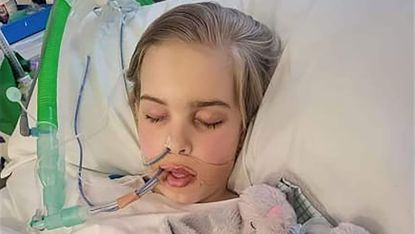Archie Battersbee: the laws of life and death
After a painful legal battle to keep their son on life support, Hollie Dance and Paul Battersbee were defeated

Until recently, none of us knew anything about Archie Battersbee, a “lively 12-year-old” and a promising gymnast, said Judith Woods in The Daily Telegraph. That all changed after 7 April this year, when Archie’s mother found him unconscious with a ligature round his neck at his home in Southend, Essex: she believes he’d been taking part in a TikTok “blackout” challenge that “went horribly wrong”. At the Royal London Hospital, he was put on a ventilator, but eventually, doctors concluded that he had suffered catastrophic and “irreversible brain stem damage”, and that it would be in his “best interests” to switch the ventilator off. His devastated parents, Hollie Dance and Paul Battersbee, “vehemently disagreed”, and pursued the matter through the courts.
Their painful battle, backed by the Christian Legal Centre, ended in defeat last week, said David Collins in The Sunday Times, and on 6 August, Archie’s life support was switched off. This “heartbreaking case” has played out across mainstream and social media, said Rachel Clarke in The Guardian. And in the sound and fury, some aspects of it have been misreported. Suffering from brain stem death is not the same as being in a coma, or a vegetative state, from which there is a chance of recovery. A person who is brain dead will never regain the automatic functions that keep us alive, including breathing. But for parents, seeing their child on a mechanical ventilator – their chest rising and falling as if they are asleep – while being told there is no hope for them, can be bewildering.
Archie’s case was further complicated by the fact that owing to his injuries, formal brain death testing was not possible. However, scans showed no blood flowing through his brain stem; necrosis had set in; and such was the swelling, the stem was being pushed out of the skull and into the spinal cord. He was “a child with no prospect of recovery”.
Subscribe to The Week
Escape your echo chamber. Get the facts behind the news, plus analysis from multiple perspectives.

Sign up for The Week's Free Newsletters
From our morning news briefing to a weekly Good News Newsletter, get the best of The Week delivered directly to your inbox.
From our morning news briefing to a weekly Good News Newsletter, get the best of The Week delivered directly to your inbox.
I understand that, said Dominic Lawson in the Daily Mail. But what troubles me is the fact that the court would not even allow his parents to move him to a hospice to die. It’s true that under English law, the child’s interests are paramount, and Archie could well have died in transit. But the court had agreed that he could not feel anything. In these circumstances, could the parents’ wishes not be taken into account? Mercifully, cases such as this, where parents and doctors cannot agree on a course of action, are rare; but if anything comes out of Archie’s story, let’s hope it is a mediation system, so that in future, the concerned parties are spared a fight in court.
Create an account with the same email registered to your subscription to unlock access.
Sign up for Today's Best Articles in your inbox
A free daily email with the biggest news stories of the day – and the best features from TheWeek.com
-
 Shardlake: a 'tightly plotted, gorgeously atmospheric piece of television'
Shardlake: a 'tightly plotted, gorgeously atmospheric piece of television'The Week Recommends Arthur Hughes captivates in this 'eminently watchable' Tudor murder mystery
By Irenie Forshaw, The Week UK Published
-
 Major League Baseball is facing an epidemic of pitcher's injuries
Major League Baseball is facing an epidemic of pitcher's injuriesUnder the Radar Many insiders are blaming the pitch clock for the rise in injuries — but the league is not so sure
By Justin Klawans, The Week US Published
-
 8 movie musicals that prove the screen can share the stage
8 movie musicals that prove the screen can share the stageThe Week Recommends The singing and dancing, bigger than life itself
By Scott Hocker, The Week US Published
-
 Speed limits: is 20 plenty?
Speed limits: is 20 plenty?Talking Point Many Welsh drivers are 'furious' at new limit, but pedestrians are 'far less likely to be killed'
By The Week Staff Published
-
 Abortion law reform: a question of safety?
Abortion law reform: a question of safety?Talking Point Jailing of woman who took abortion pills after legal limit leads to calls to scrap ‘archaic’ 1861 legislation
By Harriet Marsden Published
-
 Andy Warhol, Prince and a question of copyright
Andy Warhol, Prince and a question of copyrightTalking Point Supreme Court ruling that sent shockwaves through art world could have huge implications for AI image generation
By The Week Staff Published
-
 Disaster trolls and conspiracy theories: is legislation the answer?
Disaster trolls and conspiracy theories: is legislation the answer?Talking Point Two Manchester Arena bombing victims are taking landmark legal action against conspiracy theorist Richard D. Hall
By The Week Staff Published
-
 Menopause: a matter for the law?
Menopause: a matter for the law?Talking Point The Government has decided against making menopause a ‘protected characteristic’ under the Equality Act
By The Week Staff Published
-
 Shamima Begum: what next after ‘Isis bride’ loses bid to regain UK citizenship?
Shamima Begum: what next after ‘Isis bride’ loses bid to regain UK citizenship?Talking Point Lawyers say the Isis bride was victim of human trafficking for the purposes of sexual exploitation
By Arion McNicoll Last updated
-
 Should criminal barristers be allowed to strike?
Should criminal barristers be allowed to strike?Talking Point Prolonged dispute over cuts to pay and legal aid has led to indefinite walkout in September
By The Week Staff Published
-
 J.K. Rowling and Joanne Harris in death threat row
J.K. Rowling and Joanne Harris in death threat rowTalking Point Rowling accuses fellow author of allowing female writers to be ‘silenced and intimidated’ over their gender identity beliefs
By The Week Staff Published